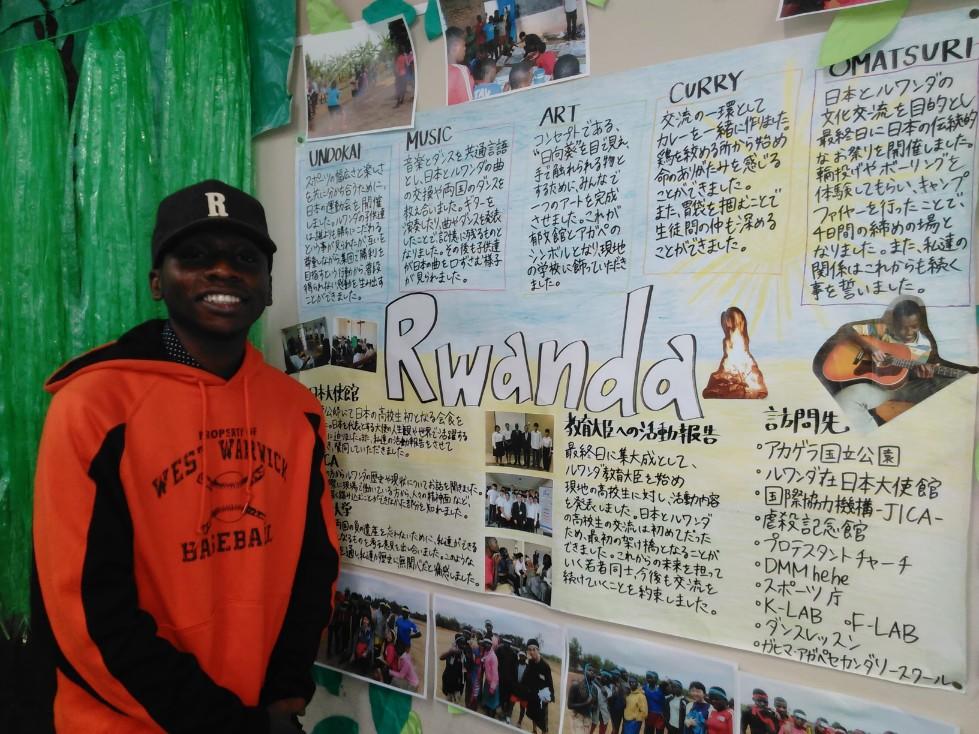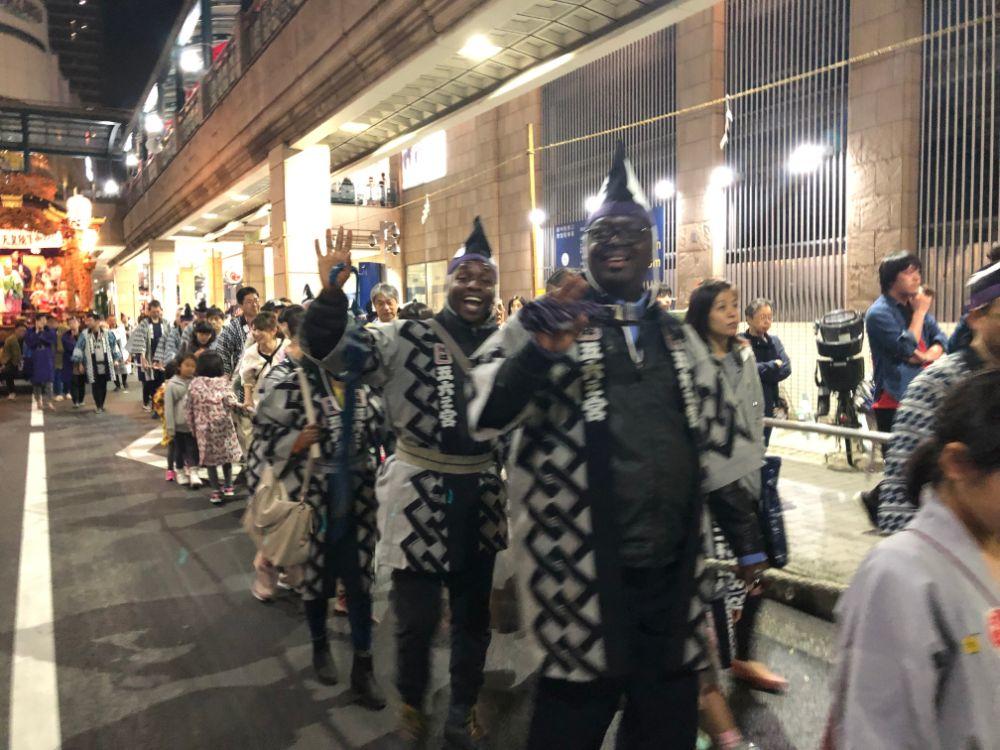Rodrigue sent us his report on his stay in Japan. Now, he's enjoying reunion with his family and friends in Burundi. He was always earger to join new activities and interact with various people and lived very busy days with studying and various activities with many people. Here, he wrote about a few things that stay in his heart strongly.
With Japanese souvenir which one of his supporters gave him.
My name is Icishatse Elie Rodrigue. I am 22 years old and I am from Burundi. I studies and lived in Japan.
From September 23rd, 2018 to July 17th, 2019, I stayed, in Japan, at Tokyo University of Foreign studies. From my home university - Protestant Institute of Arts and Social Sciences in Rwanda, I was at TUFS as an exchange student under ISEP (International Student Exchange Program). I was invited by the African Studies Center which conducted a fundraising for my airplane tickets and living expenses. In addition, I was a recipient of JASSO scholarship.
In this report, I will discuss two main points: on one hand, my studies at TUFS, and on the other hand, my life in Japan as a foreign person.
First of all, as my major is Peace and Conflict studies, I was interested in classes related to international relations, peace - building and the history of Japan as a country which experienced a dramatic change, in terms of Peace loving, from the end of the Second World War. During the Autumn semester which started in October 2018 and was completed in January 2019, I took classes on International Organizations and Human rights, Theory and Practice of Peace building and Development Cooperation and Japan. I caught a lot of lessons especially in the class on Human Rights which was my first class on such a topic. As I am from Burundi, a country that experienced political crisis recently, in 2015, I realized how human rights violations were inflicted to innocent Burundians. They didn't have any governmental institution to help them and, at a certain point of time, even the international community couldn't intervene and help. This fact was discussed in the class as my fellow classmates, under the instruction of our Professor, realized that the sovereignty of the state, sometimes, is a block to the relief of those whose human rights are violated.
During the winter period, I took a class on the Asia - Pacific war. This class was very important for me as I was eager to know about the history of wars into which Japan was involved. I didn't know that Japan used to colonize many countries. Surely, I have already learnt about Hiroshima and Nagasaki atomic bombs, but I haven't learnt the war history which led to them. During the class, which was run as seminar with different speakers and different topics, I learnt about the memory issue in Japan, the Okinawa issue with US military bases, the comfort women issue and the victimhood sense which was promoted after the A-bombs. During the last sessions of the class, we watched a movie together about the A-bomb and we conducted online discussions about the movie with Students in America. I liked the session very much.

He and Shukulu had several seminars with high school students.
During the spring semester, I took classes on cross-cultural issues of collective memory in Japan, the Allied Occupation of Japan, International cooperation, Social movements and Democracy in Postwar Japan and the Theory and Practice of the United Nations. I enjoyed the United Nations Class because I got to know some details about the organization which is famous even in Burundi, my Country. For instance, I was shocked to learn that the right of veto which is famously spoken on media is not included in the charter of the United Nations. Also, I enjoyed the end term work which was about to draft a resolution on plastic waste. I represented China, a country which used to monopolize the global imports of wastes before the ban of plastics waste importation in January 2018. I have never done a similar work during my university studies.
All in all, the classes at TUFS were very interesting and satisfying with updated academic information. Despite the good atmosphere reigning inside the classrooms, the professors were very humble. They listened to students' questions, suggestions and comments, they all presented a clear plan of the class during the first session and the plan was followed with few exceptions. Requirement readings were at the center of the education at TUFS which was very good for me because I also wanted to improvement my book- reading capabilities.
Second, in order to grasp some Japanese cultural understandings, I took classes on Introduction to Cultural Studies, Japanese Religion and Popular Culture, and Japanese Performative Culture. Also, I took Japanese language classes at JLC (Japanese Language Center). I still remember how was wonderful for me to learn and research about Takarazuka during the class on Japanese Performative Culture. I was more interested in the songs, dances and costumes of Takarazuka actresses than the gender ideals around Otokoyaku. My research, which was the end term paper, has the goal of investigating on the areas of interests in Takarazuka.
With regard to JLC classes, I completed two levels: 100 and 200 level. I enjoyed Kanji because some of them have interesting meanings which can be drawn from the combination of different Kanjis. For instance, I learnt 親 - おや(Parent). The kanji is made of three different kanji: 立つ (to stand), 木 (tree) and 見る(to see). If I can try to make sense of this kanji, a parent looks (見る) at his child standing (立つ) on a tree (木) and says あぶない。
Also, I enjoyed the Honorific Expressions (けいご) which are けんじょうご - Humble form for and そんけいご - Respect form. In Burundi, we don't have such rich structures to express the respect and the humbleness.
Outside the classrooms, I joined Choeur Soleil, a chorus club at TUFS, and LETS, an association that bring together students who speak and learn different languages in order to exchange knowledge.
As I am concluding, allow me to share what I did outside TUFS. I traveled in many places in Japan: Hiroshima, Okinawa, Osaka, Kobe, Kyoto, Ichi, Miye, Kanagawa and Shizoka. In Hiroshima, I visited the Hiroshima Peace Memorial Museum and, in Okinawa, I joined a nonviolent protest in front of Henoko base. Also, I participated in Kurayami festival and visited many Churches, Shrines and Temples such as International Christian University (ICU) Church, Ise Jingu, Meiji Shrine and Golden Temple. At Ise Jingu, on May 1st, I joined ceremonies to welcome the new emperor of Japan, at Oi Baptist Church, I participated in the commemoration of Genocide in Rwanda and, at Jindaiji temple, with a classmate from Portugal; I visited a pet cemetery which is a culture Burundians don't have. Furthermore, I stayed in families in Osaka and Nagoya. I ate and learned to cook different Japanese meals such as Nabe and Okonomiyaki. I interacted with local groups such as the Connecting Children of Africa and Japan. All in all, I can confirm that I lived in Japan and lived with Japanese.

In May 2019, at Kurayami Festival at Fuchu-shi
I want to address my sincere appreciations to my Professor Kazuyuki Sasaki, to African Studies Center, to donors in the crowdfunding, to JASSO scholarship administration and to all my friends in Japan.
Icishatse Elie Rodrigue
Short documentary that Rodrigue made
We'd like to thank supporters who donated for Rodrigue and Shukulu, those who invited them to various kinds of activities, students who helped their lives in Japan, and also Prof. Sasaki who chose and sent the great students to Japan.

